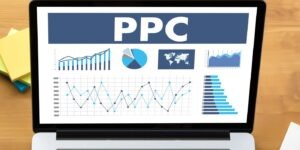Why is the Google PPC price so high?
If you have ever run a Google Ads campaign, you’re more than likely asking “why is the Google ad rank so high?” For the majority of businesses the cost per click can be outrageous, especially when paying £10, £50, or even more for a single visitor.
But there’s a reason for these prices. In this article, we’ll explore what drives up the Google paid search cost, how it varies across industries, and why despite the cost, rising google ad cost, increasing google PPC cost, PPC marketing is still worth your investment.
How Google determines PPC advertising prices
The auction system behind Google ads
Google Ads uses an auction system which runs every time when someone searches something. Operating whenever multiple bids on the same keyword are placed, because of how ad cost is influenced by bidding competition, Google will then determine which search Ads will show up and in what position based on Ad Rank
Ad Rank is calculated using:
- Actual CPC cost: The actual cost of your CPC is influenced by your ad rank and the competition
- Google ads Quality Score: The measure of your ad’s quality and relevance, based on expected click through rate and ad relevance
- Expected impact: Google will estimate the expected impact on features such as sitelinks, callouts and other extensions based on user experience
Contrary to popular belief, the highest bidder doesn’t always win. If your ad is more relevant and better optimised, you can actually rank higher and pay less per click than competitors.
The role of Quality Score
Your Quality Score is a rating Google assigns to each keyword from a rating between 1 to 10. The higher your ad quality, the better your ad will be placed and lower your costs.
This means advertisers with well-written ads, relevant landing pages, and higher click-through rates can achieve lower PPC advertising prices over time.
Industry competition and keyword demand
Certain industries have much higher keyword competition than others. For example, keywords in industries such as “consumer services” will cost around £4.81 which are typically quite expensive but keywords in ecommerce will cost around 87p which can be a lot more affordable depending on CPC budget.
As demand increases, so does your Google paid search cost, which directly impacts both your Google PPC cost and your Google Ads pricing. In industries with high customer lifetime value, advertisers are willing to spend more per lead further driving up prices for everyone.
PPC works effectively when there is a clear value proposition and a defined audience, which further showcases why competitive industries are willing to pay higher CPCs, knowing that the quality leads can justify the budget spent.
Understanding CPC vs. CPA in PPC marketing
What is cost per click (CPC)?
CPC refers to how much you’re paying for each click on your ad. It’s a useful budgeting metric but doesn’t tell the whole story of campaign success.
The average cost per click can vary across most industries, reflecting fluctuations in Google ad cost, typically between 87p to over 5 pounds, with some more expensive industries such as “Legal” often exceeding between £3.76 to an extreme of £38, according to recent industry research.
These numbers can be intimidating at first especially when trying to navigate google ads pricing when you’re not experienced in this field, but high CPC alone doesn’t mean a campaign is unprofitable.
What is cost per acquisition (CPA)?
CPA, or cost per acquisition, is a marketing metric which measures the overall cost of acquiring a new customer or achieving a desired conversion goal through a marketing campaign or action.
Step by step breakdown:
- Adding up all expenses related to your marketing campaign
- Counting the number of new customers or leads
- Dividing the total cost by the number of conversions (CPA = total cost / number of conversions)
You could have a high CPC and still maintain a low CPA if your ads convert efficiently. For example, a campaign spending £50 per click may still be profitable if 1 in 5 clicks becomes a £1,000 client.
This is why CPC and CPA must be viewed together when analysing PPC marketing cost.
How PPC advertising prices vary by industry
PPC cost is heavily influenced by industry benchmarks. Below is a general breakdown of average CPCs:
| Industry | Avg. CPC Range |
| Insurance | £3 – £12 |
| Home Services | £2.21 – £6.78 |
| Legal | £4.50 – £6.44 |
| Finance | £3.44 – £5.16 |
| Ecommerce | £0.45 – £3.75 |
| Education | £1.80 – £2.33 |
| Healthcare | £091 – £1.52 |
A law firm could earn thousands from one client, so a high CPC is acceptable. A small ecommerce brand with low margins, on the other hand, needs to keep pay per click advertising rates as low as possible.
Why high PPC costs can still deliver strong ROI
High intent means high conversion potential
Most Google searchers have a purpose which makes search ads especially more effective when reaching customers ready to convert. They are actively searching for a product, service, or solution rather than merely perusing. Compared to social media or display ads, that intent results in greater conversion rates.
This implies that the possibility of obtaining a paying client is increased even if your Google AdWords search expense is high.
You only pay for performance
Pay per click advertising means only paying when people click on your ad. This makes it easier to justify higher ad budgets as you are guaranteeing meaningful engagement for money spent. An important part of this is calculating your clickthrough rate to fully understand your ROI and impact of the PPC campaign.
A good PPC campaign can make a huge difference to your ROI, as one UK workwear brand found, using PPC to increase their revenue from £184k to £734k in just two weeks, while maintaining a 4x ROAS. This clearly demonstrates how even high PPC costs can be beneficial when campaigns are structured effectively.
Better targeting = better results
Google Ads gives you tools to fine-tune who sees your ads, including:
- Geographic targeting
- Time-of-day scheduling
- Audience demographics
- Device-specific bidding
With this degree of control, you can make sure that your PPC advertising costs are based on performance rather than wasted impressions.
How to manage and reduce PPC marketing costs
Use negative keywords
Negative keywords prevent your ads from showing on irrelevant searches. This reduces wasted spend and improves overall ad relevance.
Focus on long-tail keywords
Longer, more specific keywords tend to have lower competition and higher conversion intent. For example:
- “Buy running shoes” = High CPC
- “Buy women’s trail running shoes size 8” = Lower CPC, better intent
Tools such as Google Ads Auction Insights and SEMrush can help you conduct a PPC competitor analysis, and reveal where they might be overspending. This allows you to adjust your bids and reduce unnecessary costs by narrowing down your own targeting.
Improve landing pages
If you’re spending £10 or more per click, you need a landing page that converts. A clean, fast-loading page with clear calls-to-action can lower your CPA and justify higher CPC.
Leverage Smart Bidding to Optimise Costs
Smart bidding strategies
Use Google’s automated bidding tools like:
- Target CPA
- Target ROAS
- Maximize Conversions
These tools help optimise bids based on your goals, reducing manual work and wasted budget.
Final thoughts: The cost of pay-per-click is still worthwhile
Although the PPC management may appear excessive, it accurately represents the worth and purpose of each search including the reason ads cost what they do. Even if PPC advertising costs are high in some industries, when ads are managed well, the return on investment can still be very high, particularly when using well optimised search ads with high intent targeting.
Rather than focusing only on the cost per click, advertisers should consider:
- Conversion rates
- CPA vs. CPC
- Overall profitability and ROAS
Smart ad spend strategies like using smarter targeting by using smarter targeting, negative keywords, and better landing pages, you can keep your PPC marketing cost under control and get the most value from every pound spent.
If you’re in need of support with PPC campaign management, you can reach out to our team to help optimise your campaigns, lower costs, and maximise ROI




